Pharmaceutical Regulatory Affairs and Brexit: UK's Reference Status
VerifiedAdded on 2022/10/11
|52
|15742
|12
Thesis and Dissertation
AI Summary
This master's dissertation, submitted in August 2019, investigates the legal status of mutually recognized pharmaceutical authorizations following the United Kingdom's departure from the European Union. The research, conducted by Rajeev Joshi for a Master of Science in Pharmaceutical Regulatory Affairs, examines the implications of Brexit, specifically focusing on the UK's role as a Reference Member State. The study explores the regulatory changes, including the impact on marketing authorizations, the decentralized recognition procedure, and the role of the UK as a rapporteur for central approvals. The dissertation assesses the challenges and opportunities for the pharmaceutical industry, considering the impact of a 'hard Brexit' scenario and the potential need for transitional arrangements. It also analyzes the effect on international standards in life sciences and provides an overview of the regulatory aspects that need to be considered when making strategic decisions related to the consequences of Brexit. The research includes a review of the legal basis, principles, and relevant literature, as well as an analysis of pre- and post-Brexit figures, drug pricing, and clinical trials, providing valuable insights into the future of pharmaceutical regulation and the industry's adaptation to the new environment.
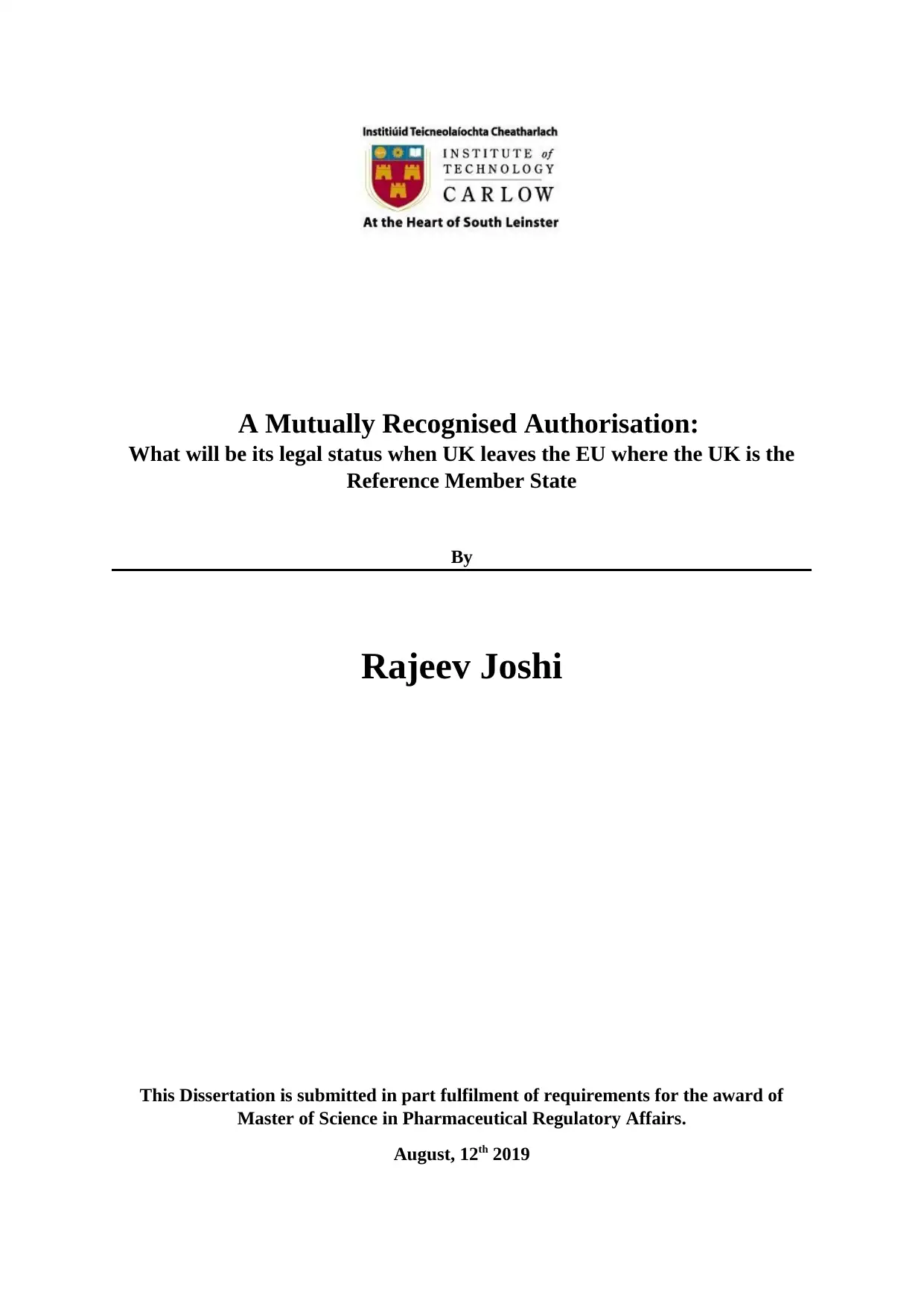
A Mutually Recognised Authorisation:
What will be its legal status when UK leaves the EU where the UK is the
Reference Member State
By
Rajeev Joshi
This Dissertation is submitted in part fulfilment of requirements for the award of
Master of Science in Pharmaceutical Regulatory Affairs.
August, 12th 2019
What will be its legal status when UK leaves the EU where the UK is the
Reference Member State
By
Rajeev Joshi
This Dissertation is submitted in part fulfilment of requirements for the award of
Master of Science in Pharmaceutical Regulatory Affairs.
August, 12th 2019
Paraphrase This Document
Need a fresh take? Get an instant paraphrase of this document with our AI Paraphraser
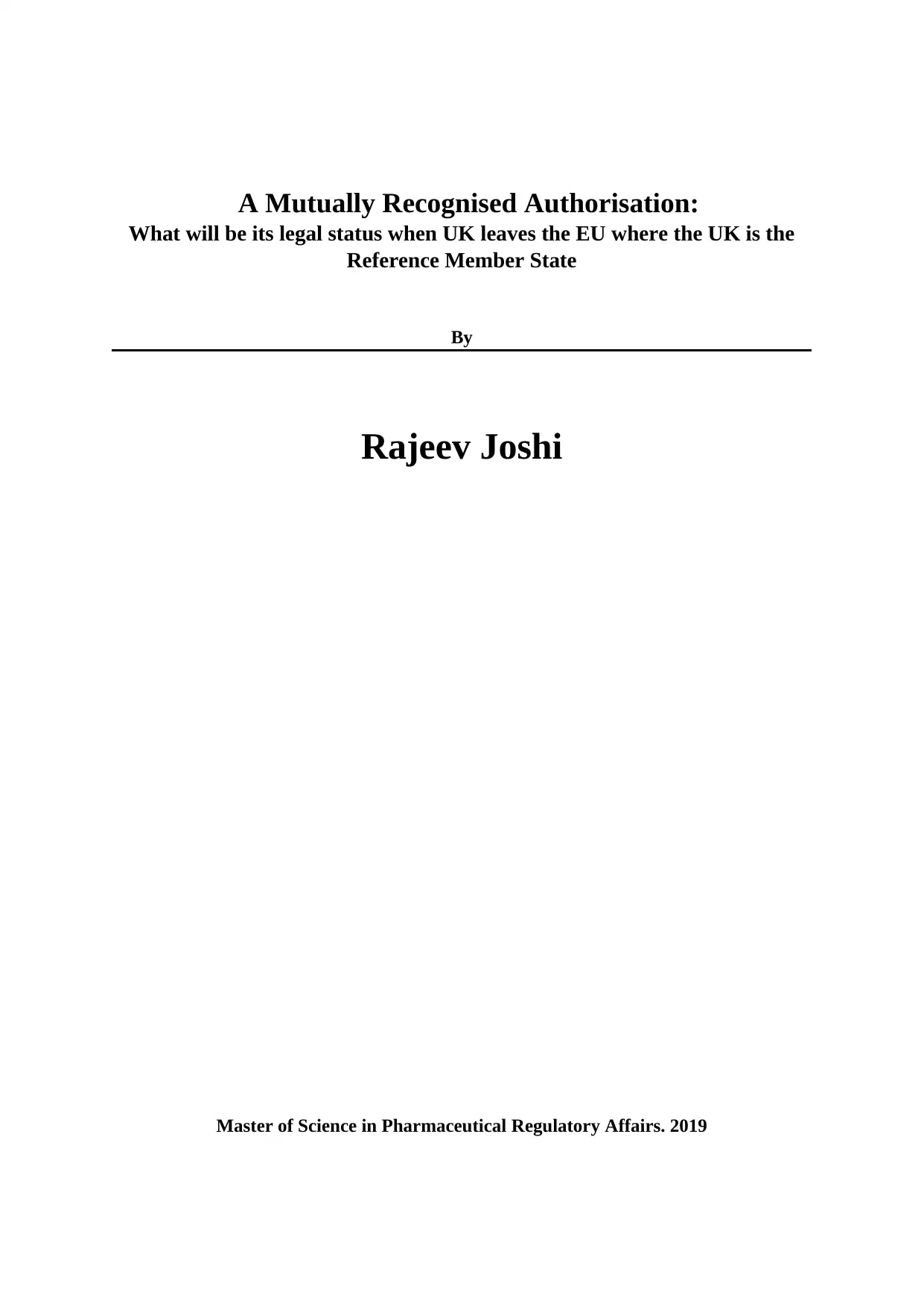
A Mutually Recognised Authorisation:
What will be its legal status when UK leaves the EU where the UK is the
Reference Member State
By
Rajeev Joshi
Master of Science in Pharmaceutical Regulatory Affairs. 2019
What will be its legal status when UK leaves the EU where the UK is the
Reference Member State
By
Rajeev Joshi
Master of Science in Pharmaceutical Regulatory Affairs. 2019
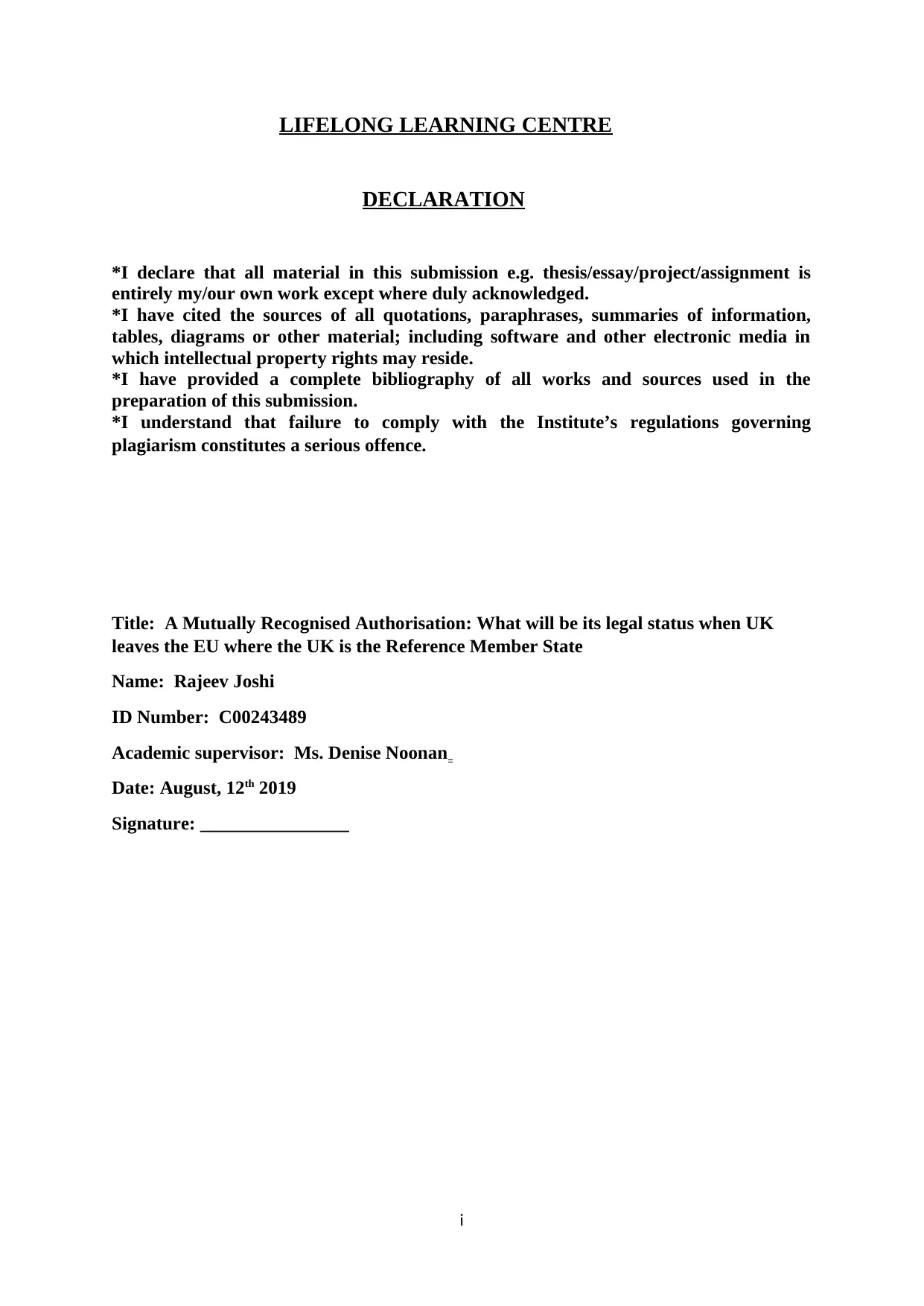
LIFELONG LEARNING CENTRE
DECLARATION
*I declare that all material in this submission e.g. thesis/essay/project/assignment is
entirely my/our own work except where duly acknowledged.
*I have cited the sources of all quotations, paraphrases, summaries of information,
tables, diagrams or other material; including software and other electronic media in
which intellectual property rights may reside.
*I have provided a complete bibliography of all works and sources used in the
preparation of this submission.
*I understand that failure to comply with the Institute’s regulations governing
plagiarism constitutes a serious offence.
Title: A Mutually Recognised Authorisation: What will be its legal status when UK
leaves the EU where the UK is the Reference Member State
Name: Rajeev Joshi
ID Number: C00243489
Academic supervisor: Ms. Denise Noonan
Date: August, 12th 2019
Signature: ________________
i
DECLARATION
*I declare that all material in this submission e.g. thesis/essay/project/assignment is
entirely my/our own work except where duly acknowledged.
*I have cited the sources of all quotations, paraphrases, summaries of information,
tables, diagrams or other material; including software and other electronic media in
which intellectual property rights may reside.
*I have provided a complete bibliography of all works and sources used in the
preparation of this submission.
*I understand that failure to comply with the Institute’s regulations governing
plagiarism constitutes a serious offence.
Title: A Mutually Recognised Authorisation: What will be its legal status when UK
leaves the EU where the UK is the Reference Member State
Name: Rajeev Joshi
ID Number: C00243489
Academic supervisor: Ms. Denise Noonan
Date: August, 12th 2019
Signature: ________________
i
⊘ This is a preview!⊘
Do you want full access?
Subscribe today to unlock all pages.

Trusted by 1+ million students worldwide
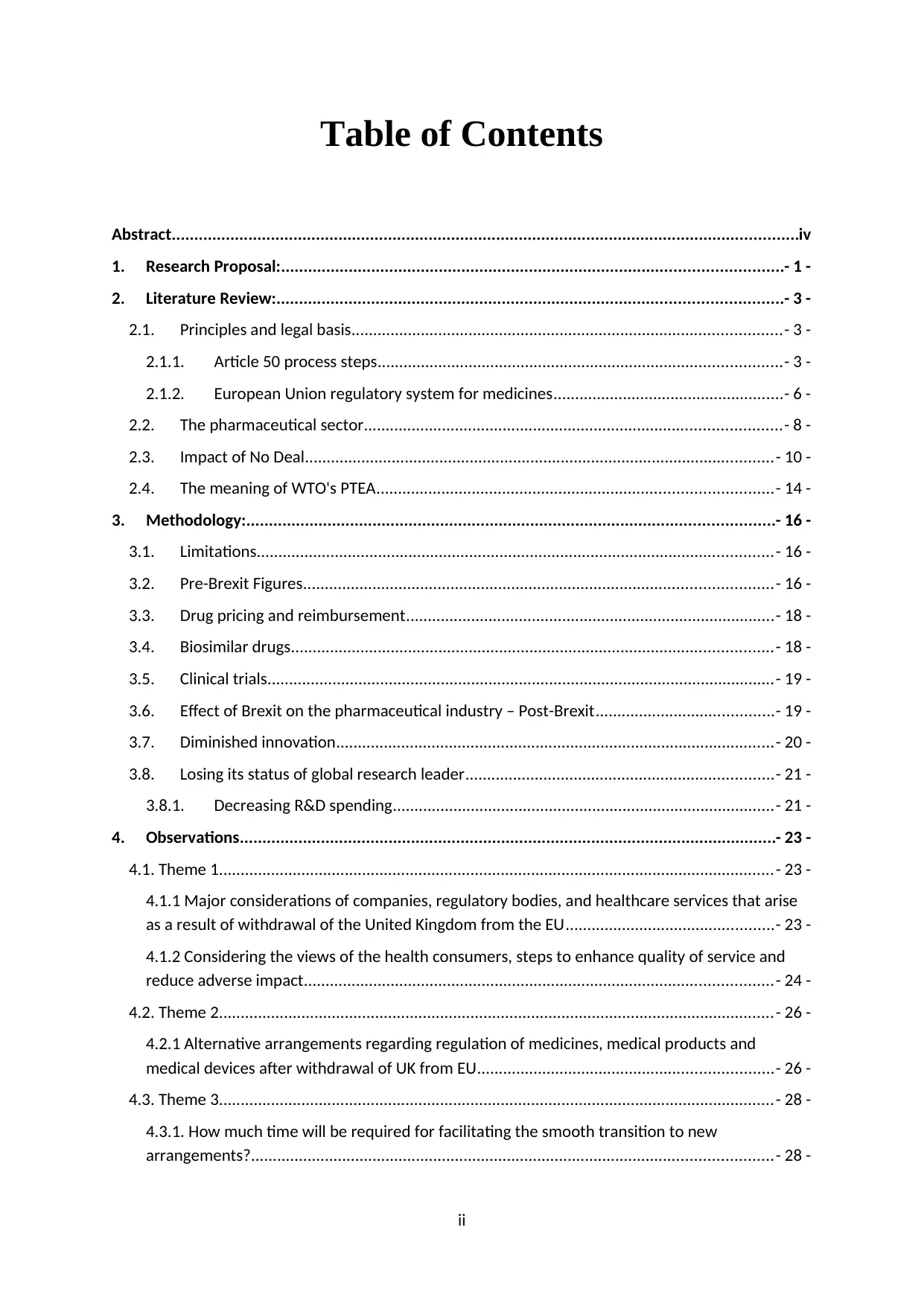
Table of Contents
Abstract...........................................................................................................................................iv
1. Research Proposal:...............................................................................................................- 1 -
2. Literature Review:................................................................................................................- 3 -
2.1. Principles and legal basis...................................................................................................- 3 -
2.1.1. Article 50 process steps.............................................................................................- 3 -
2.1.2. European Union regulatory system for medicines.....................................................- 6 -
2.2. The pharmaceutical sector................................................................................................- 8 -
2.3. Impact of No Deal............................................................................................................- 10 -
2.4. The meaning of WTO's PTEA...........................................................................................- 14 -
3. Methodology:.....................................................................................................................- 16 -
3.1. Limitations.......................................................................................................................- 16 -
3.2. Pre-Brexit Figures............................................................................................................- 16 -
3.3. Drug pricing and reimbursement.....................................................................................- 18 -
3.4. Biosimilar drugs...............................................................................................................- 18 -
3.5. Clinical trials.....................................................................................................................- 19 -
3.6. Effect of Brexit on the pharmaceutical industry – Post-Brexit.........................................- 19 -
3.7. Diminished innovation.....................................................................................................- 20 -
3.8. Losing its status of global research leader.......................................................................- 21 -
3.8.1. Decreasing R&D spending........................................................................................- 21 -
4. Observations.......................................................................................................................- 23 -
4.1. Theme 1................................................................................................................................- 23 -
4.1.1 Major considerations of companies, regulatory bodies, and healthcare services that arise
as a result of withdrawal of the United Kingdom from the EU................................................- 23 -
4.1.2 Considering the views of the health consumers, steps to enhance quality of service and
reduce adverse impact............................................................................................................- 24 -
4.2. Theme 2................................................................................................................................- 26 -
4.2.1 Alternative arrangements regarding regulation of medicines, medical products and
medical devices after withdrawal of UK from EU....................................................................- 26 -
4.3. Theme 3................................................................................................................................- 28 -
4.3.1. How much time will be required for facilitating the smooth transition to new
arrangements?........................................................................................................................- 28 -
ii
Abstract...........................................................................................................................................iv
1. Research Proposal:...............................................................................................................- 1 -
2. Literature Review:................................................................................................................- 3 -
2.1. Principles and legal basis...................................................................................................- 3 -
2.1.1. Article 50 process steps.............................................................................................- 3 -
2.1.2. European Union regulatory system for medicines.....................................................- 6 -
2.2. The pharmaceutical sector................................................................................................- 8 -
2.3. Impact of No Deal............................................................................................................- 10 -
2.4. The meaning of WTO's PTEA...........................................................................................- 14 -
3. Methodology:.....................................................................................................................- 16 -
3.1. Limitations.......................................................................................................................- 16 -
3.2. Pre-Brexit Figures............................................................................................................- 16 -
3.3. Drug pricing and reimbursement.....................................................................................- 18 -
3.4. Biosimilar drugs...............................................................................................................- 18 -
3.5. Clinical trials.....................................................................................................................- 19 -
3.6. Effect of Brexit on the pharmaceutical industry – Post-Brexit.........................................- 19 -
3.7. Diminished innovation.....................................................................................................- 20 -
3.8. Losing its status of global research leader.......................................................................- 21 -
3.8.1. Decreasing R&D spending........................................................................................- 21 -
4. Observations.......................................................................................................................- 23 -
4.1. Theme 1................................................................................................................................- 23 -
4.1.1 Major considerations of companies, regulatory bodies, and healthcare services that arise
as a result of withdrawal of the United Kingdom from the EU................................................- 23 -
4.1.2 Considering the views of the health consumers, steps to enhance quality of service and
reduce adverse impact............................................................................................................- 24 -
4.2. Theme 2................................................................................................................................- 26 -
4.2.1 Alternative arrangements regarding regulation of medicines, medical products and
medical devices after withdrawal of UK from EU....................................................................- 26 -
4.3. Theme 3................................................................................................................................- 28 -
4.3.1. How much time will be required for facilitating the smooth transition to new
arrangements?........................................................................................................................- 28 -
ii
Paraphrase This Document
Need a fresh take? Get an instant paraphrase of this document with our AI Paraphraser
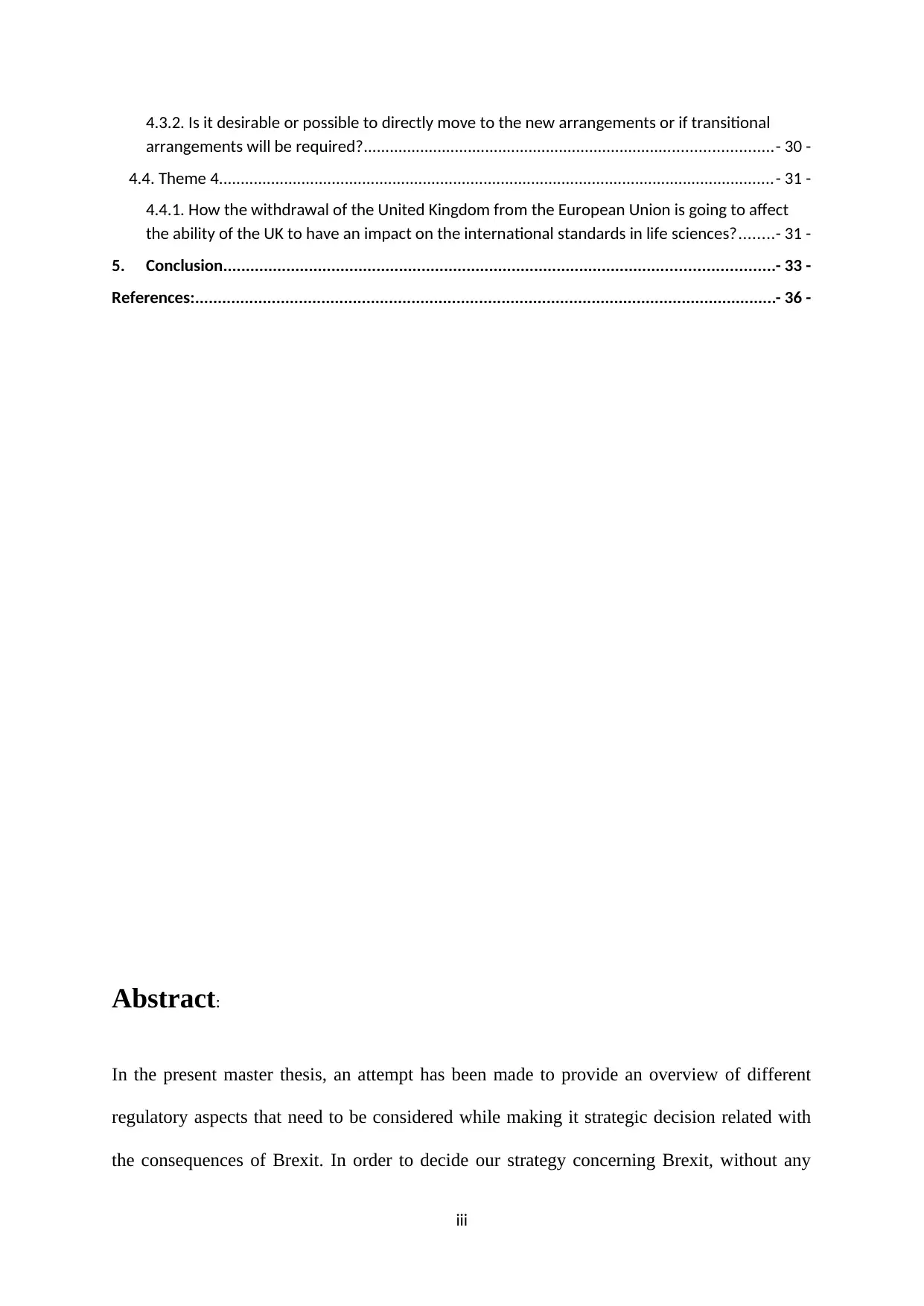
4.3.2. Is it desirable or possible to directly move to the new arrangements or if transitional
arrangements will be required?..............................................................................................- 30 -
4.4. Theme 4................................................................................................................................- 31 -
4.4.1. How the withdrawal of the United Kingdom from the European Union is going to affect
the ability of the UK to have an impact on the international standards in life sciences?........- 31 -
5. Conclusion..........................................................................................................................- 33 -
References:.................................................................................................................................- 36 -
Abstract:
In the present master thesis, an attempt has been made to provide an overview of different
regulatory aspects that need to be considered while making it strategic decision related with
the consequences of Brexit. In order to decide our strategy concerning Brexit, without any
iii
arrangements will be required?..............................................................................................- 30 -
4.4. Theme 4................................................................................................................................- 31 -
4.4.1. How the withdrawal of the United Kingdom from the European Union is going to affect
the ability of the UK to have an impact on the international standards in life sciences?........- 31 -
5. Conclusion..........................................................................................................................- 33 -
References:.................................................................................................................................- 36 -
Abstract:
In the present master thesis, an attempt has been made to provide an overview of different
regulatory aspects that need to be considered while making it strategic decision related with
the consequences of Brexit. In order to decide our strategy concerning Brexit, without any
iii
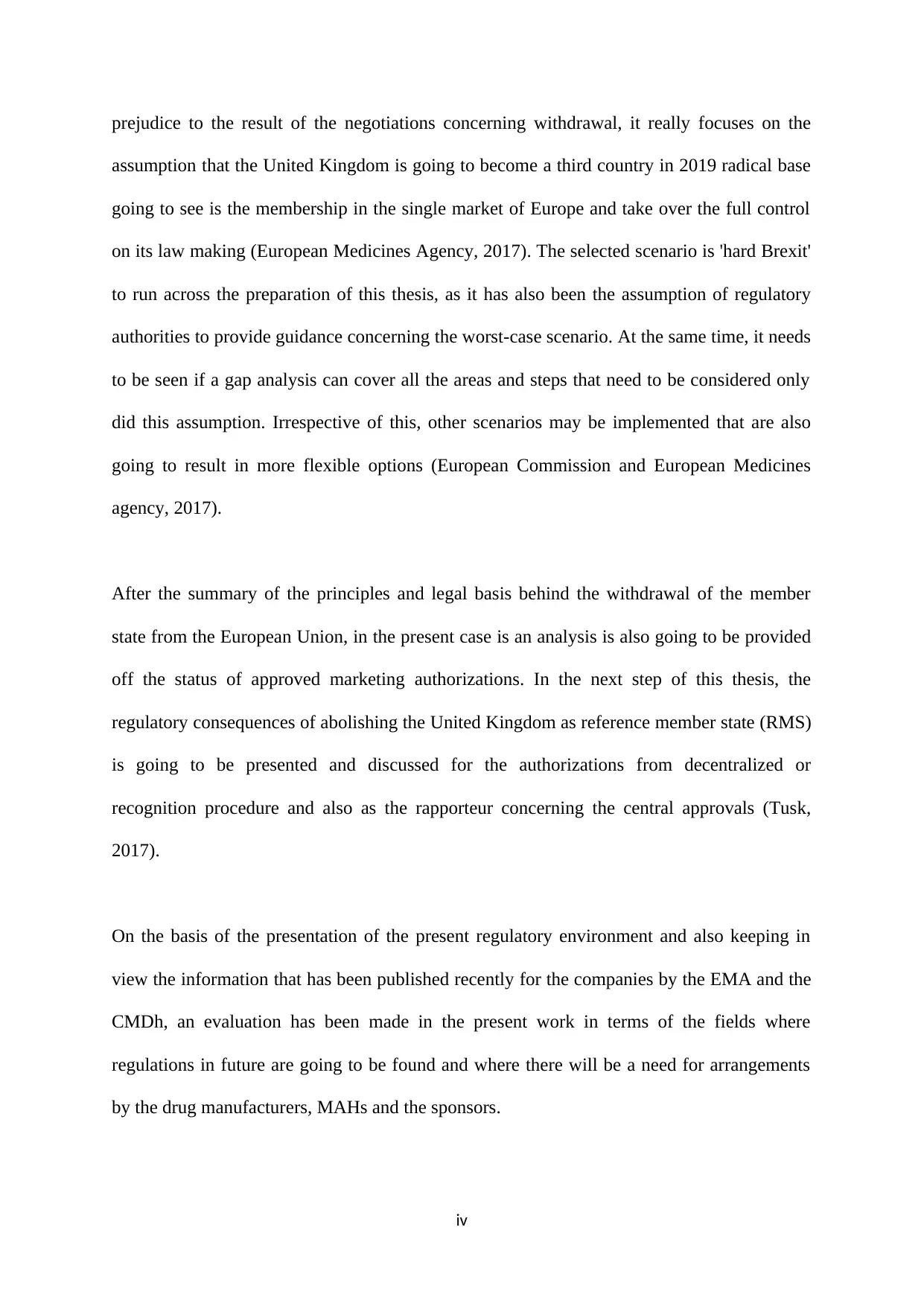
prejudice to the result of the negotiations concerning withdrawal, it really focuses on the
assumption that the United Kingdom is going to become a third country in 2019 radical base
going to see is the membership in the single market of Europe and take over the full control
on its law making (European Medicines Agency, 2017). The selected scenario is 'hard Brexit'
to run across the preparation of this thesis, as it has also been the assumption of regulatory
authorities to provide guidance concerning the worst-case scenario. At the same time, it needs
to be seen if a gap analysis can cover all the areas and steps that need to be considered only
did this assumption. Irrespective of this, other scenarios may be implemented that are also
going to result in more flexible options (European Commission and European Medicines
agency, 2017).
After the summary of the principles and legal basis behind the withdrawal of the member
state from the European Union, in the present case is an analysis is also going to be provided
off the status of approved marketing authorizations. In the next step of this thesis, the
regulatory consequences of abolishing the United Kingdom as reference member state (RMS)
is going to be presented and discussed for the authorizations from decentralized or
recognition procedure and also as the rapporteur concerning the central approvals (Tusk,
2017).
On the basis of the presentation of the present regulatory environment and also keeping in
view the information that has been published recently for the companies by the EMA and the
CMDh, an evaluation has been made in the present work in terms of the fields where
regulations in future are going to be found and where there will be a need for arrangements
by the drug manufacturers, MAHs and the sponsors.
iv
assumption that the United Kingdom is going to become a third country in 2019 radical base
going to see is the membership in the single market of Europe and take over the full control
on its law making (European Medicines Agency, 2017). The selected scenario is 'hard Brexit'
to run across the preparation of this thesis, as it has also been the assumption of regulatory
authorities to provide guidance concerning the worst-case scenario. At the same time, it needs
to be seen if a gap analysis can cover all the areas and steps that need to be considered only
did this assumption. Irrespective of this, other scenarios may be implemented that are also
going to result in more flexible options (European Commission and European Medicines
agency, 2017).
After the summary of the principles and legal basis behind the withdrawal of the member
state from the European Union, in the present case is an analysis is also going to be provided
off the status of approved marketing authorizations. In the next step of this thesis, the
regulatory consequences of abolishing the United Kingdom as reference member state (RMS)
is going to be presented and discussed for the authorizations from decentralized or
recognition procedure and also as the rapporteur concerning the central approvals (Tusk,
2017).
On the basis of the presentation of the present regulatory environment and also keeping in
view the information that has been published recently for the companies by the EMA and the
CMDh, an evaluation has been made in the present work in terms of the fields where
regulations in future are going to be found and where there will be a need for arrangements
by the drug manufacturers, MAHs and the sponsors.
iv
⊘ This is a preview!⊘
Do you want full access?
Subscribe today to unlock all pages.

Trusted by 1+ million students worldwide

Brexit: It is a word that is used as a shorthand way of saying the UK leaving the EU -
merging the words Britain and exit to get Brexit.
Key Words: Brexit, Mutual Recognition, Medicinal Product, Article 50.
v
merging the words Britain and exit to get Brexit.
Key Words: Brexit, Mutual Recognition, Medicinal Product, Article 50.
v
Paraphrase This Document
Need a fresh take? Get an instant paraphrase of this document with our AI Paraphraser
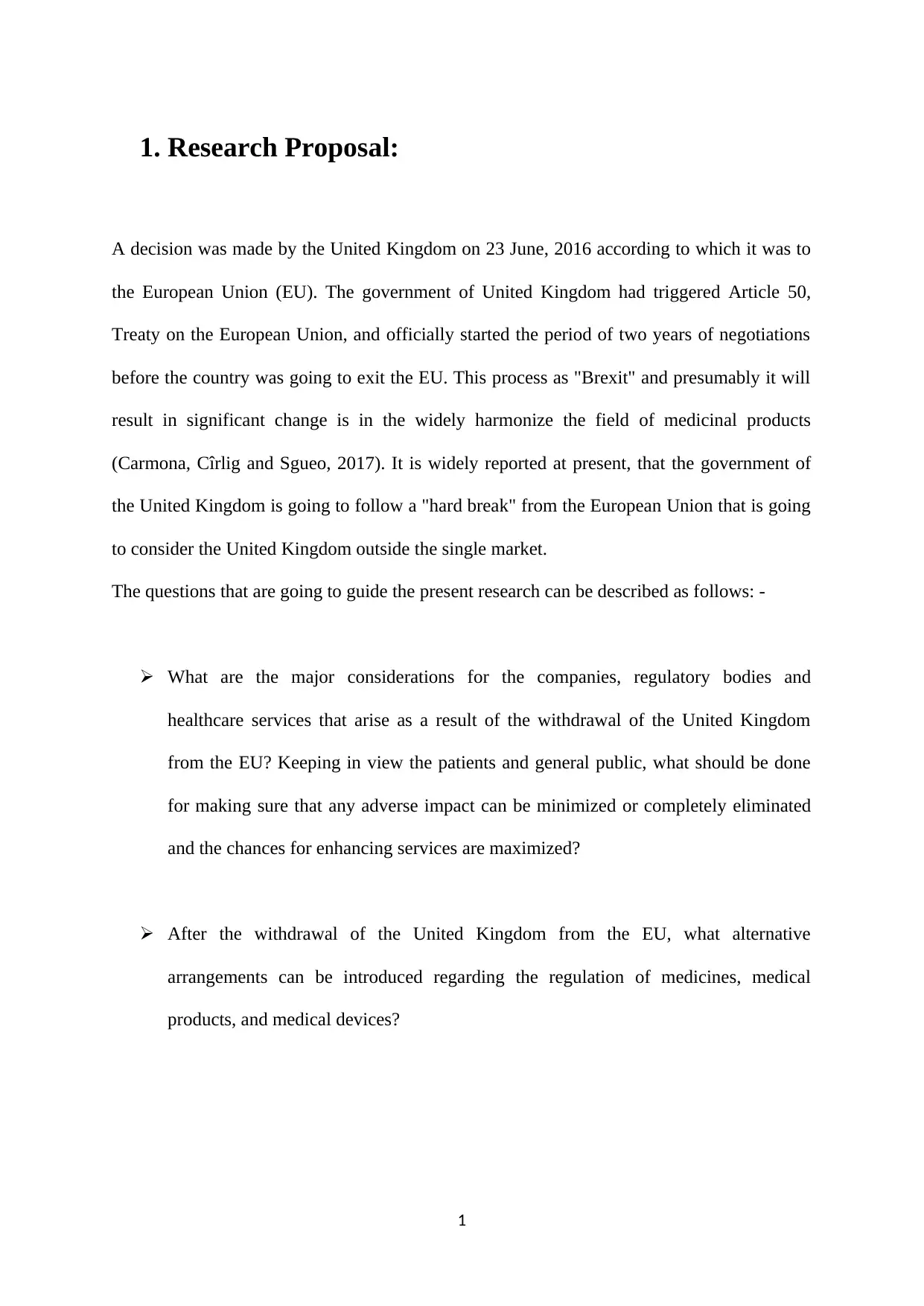
1. Research Proposal:
A decision was made by the United Kingdom on 23 June, 2016 according to which it was to
the European Union (EU). The government of United Kingdom had triggered Article 50,
Treaty on the European Union, and officially started the period of two years of negotiations
before the country was going to exit the EU. This process as "Brexit" and presumably it will
result in significant change is in the widely harmonize the field of medicinal products
(Carmona, Cîrlig and Sgueo, 2017). It is widely reported at present, that the government of
the United Kingdom is going to follow a "hard break" from the European Union that is going
to consider the United Kingdom outside the single market.
The questions that are going to guide the present research can be described as follows: -
What are the major considerations for the companies, regulatory bodies and
healthcare services that arise as a result of the withdrawal of the United Kingdom
from the EU? Keeping in view the patients and general public, what should be done
for making sure that any adverse impact can be minimized or completely eliminated
and the chances for enhancing services are maximized?
After the withdrawal of the United Kingdom from the EU, what alternative
arrangements can be introduced regarding the regulation of medicines, medical
products, and medical devices?
1
A decision was made by the United Kingdom on 23 June, 2016 according to which it was to
the European Union (EU). The government of United Kingdom had triggered Article 50,
Treaty on the European Union, and officially started the period of two years of negotiations
before the country was going to exit the EU. This process as "Brexit" and presumably it will
result in significant change is in the widely harmonize the field of medicinal products
(Carmona, Cîrlig and Sgueo, 2017). It is widely reported at present, that the government of
the United Kingdom is going to follow a "hard break" from the European Union that is going
to consider the United Kingdom outside the single market.
The questions that are going to guide the present research can be described as follows: -
What are the major considerations for the companies, regulatory bodies and
healthcare services that arise as a result of the withdrawal of the United Kingdom
from the EU? Keeping in view the patients and general public, what should be done
for making sure that any adverse impact can be minimized or completely eliminated
and the chances for enhancing services are maximized?
After the withdrawal of the United Kingdom from the EU, what alternative
arrangements can be introduced regarding the regulation of medicines, medical
products, and medical devices?
1
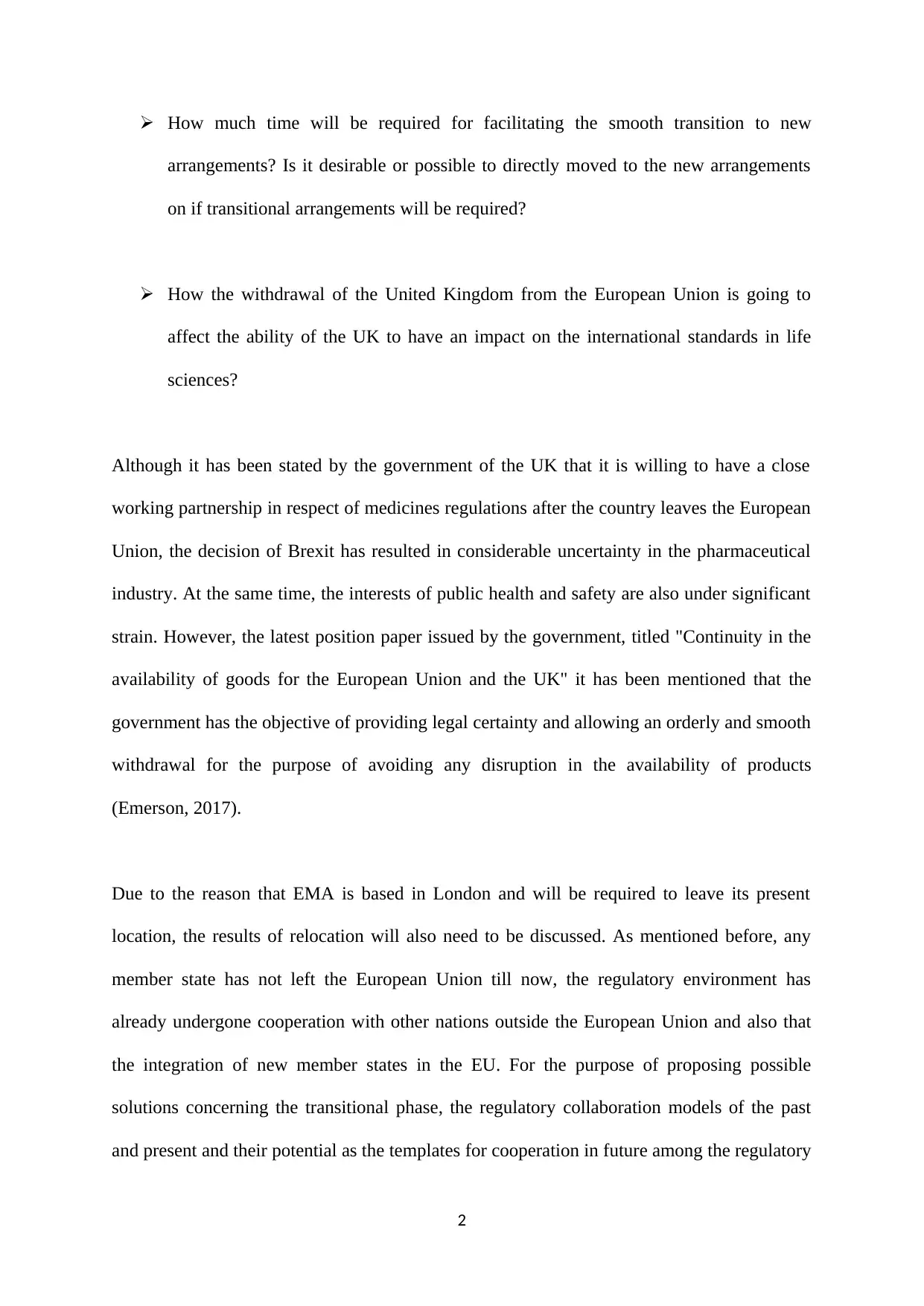
How much time will be required for facilitating the smooth transition to new
arrangements? Is it desirable or possible to directly moved to the new arrangements
on if transitional arrangements will be required?
How the withdrawal of the United Kingdom from the European Union is going to
affect the ability of the UK to have an impact on the international standards in life
sciences?
Although it has been stated by the government of the UK that it is willing to have a close
working partnership in respect of medicines regulations after the country leaves the European
Union, the decision of Brexit has resulted in considerable uncertainty in the pharmaceutical
industry. At the same time, the interests of public health and safety are also under significant
strain. However, the latest position paper issued by the government, titled "Continuity in the
availability of goods for the European Union and the UK" it has been mentioned that the
government has the objective of providing legal certainty and allowing an orderly and smooth
withdrawal for the purpose of avoiding any disruption in the availability of products
(Emerson, 2017).
Due to the reason that EMA is based in London and will be required to leave its present
location, the results of relocation will also need to be discussed. As mentioned before, any
member state has not left the European Union till now, the regulatory environment has
already undergone cooperation with other nations outside the European Union and also that
the integration of new member states in the EU. For the purpose of proposing possible
solutions concerning the transitional phase, the regulatory collaboration models of the past
and present and their potential as the templates for cooperation in future among the regulatory
2
arrangements? Is it desirable or possible to directly moved to the new arrangements
on if transitional arrangements will be required?
How the withdrawal of the United Kingdom from the European Union is going to
affect the ability of the UK to have an impact on the international standards in life
sciences?
Although it has been stated by the government of the UK that it is willing to have a close
working partnership in respect of medicines regulations after the country leaves the European
Union, the decision of Brexit has resulted in considerable uncertainty in the pharmaceutical
industry. At the same time, the interests of public health and safety are also under significant
strain. However, the latest position paper issued by the government, titled "Continuity in the
availability of goods for the European Union and the UK" it has been mentioned that the
government has the objective of providing legal certainty and allowing an orderly and smooth
withdrawal for the purpose of avoiding any disruption in the availability of products
(Emerson, 2017).
Due to the reason that EMA is based in London and will be required to leave its present
location, the results of relocation will also need to be discussed. As mentioned before, any
member state has not left the European Union till now, the regulatory environment has
already undergone cooperation with other nations outside the European Union and also that
the integration of new member states in the EU. For the purpose of proposing possible
solutions concerning the transitional phase, the regulatory collaboration models of the past
and present and their potential as the templates for cooperation in future among the regulatory
2
⊘ This is a preview!⊘
Do you want full access?
Subscribe today to unlock all pages.

Trusted by 1+ million students worldwide
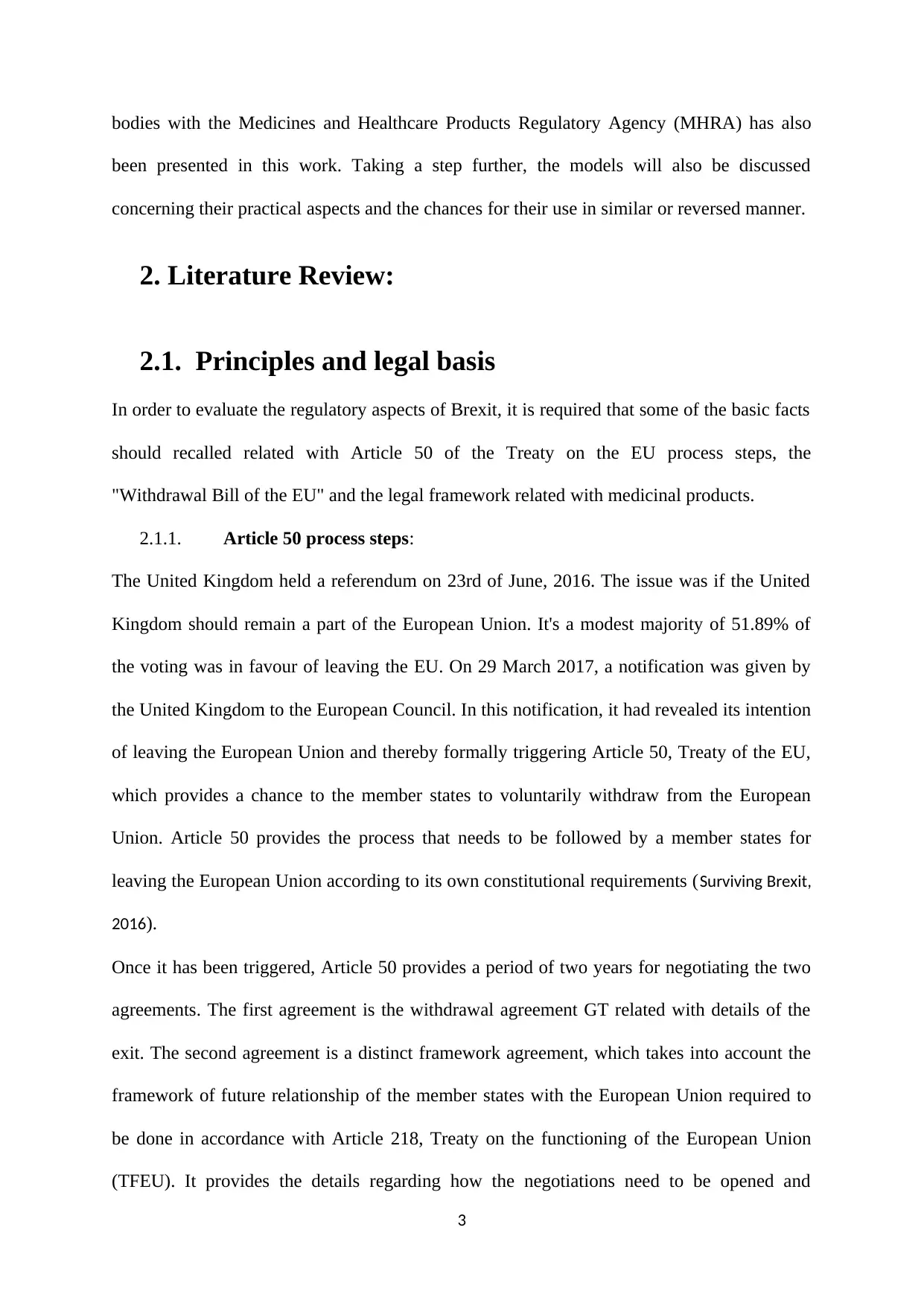
bodies with the Medicines and Healthcare Products Regulatory Agency (MHRA) has also
been presented in this work. Taking a step further, the models will also be discussed
concerning their practical aspects and the chances for their use in similar or reversed manner.
2. Literature Review:
2.1. Principles and legal basis
In order to evaluate the regulatory aspects of Brexit, it is required that some of the basic facts
should recalled related with Article 50 of the Treaty on the EU process steps, the
"Withdrawal Bill of the EU" and the legal framework related with medicinal products.
2.1.1. Article 50 process steps:
The United Kingdom held a referendum on 23rd of June, 2016. The issue was if the United
Kingdom should remain a part of the European Union. It's a modest majority of 51.89% of
the voting was in favour of leaving the EU. On 29 March 2017, a notification was given by
the United Kingdom to the European Council. In this notification, it had revealed its intention
of leaving the European Union and thereby formally triggering Article 50, Treaty of the EU,
which provides a chance to the member states to voluntarily withdraw from the European
Union. Article 50 provides the process that needs to be followed by a member states for
leaving the European Union according to its own constitutional requirements (Surviving Brexit,
2016).
Once it has been triggered, Article 50 provides a period of two years for negotiating the two
agreements. The first agreement is the withdrawal agreement GT related with details of the
exit. The second agreement is a distinct framework agreement, which takes into account the
framework of future relationship of the member states with the European Union required to
be done in accordance with Article 218, Treaty on the functioning of the European Union
(TFEU). It provides the details regarding how the negotiations need to be opened and
3
been presented in this work. Taking a step further, the models will also be discussed
concerning their practical aspects and the chances for their use in similar or reversed manner.
2. Literature Review:
2.1. Principles and legal basis
In order to evaluate the regulatory aspects of Brexit, it is required that some of the basic facts
should recalled related with Article 50 of the Treaty on the EU process steps, the
"Withdrawal Bill of the EU" and the legal framework related with medicinal products.
2.1.1. Article 50 process steps:
The United Kingdom held a referendum on 23rd of June, 2016. The issue was if the United
Kingdom should remain a part of the European Union. It's a modest majority of 51.89% of
the voting was in favour of leaving the EU. On 29 March 2017, a notification was given by
the United Kingdom to the European Council. In this notification, it had revealed its intention
of leaving the European Union and thereby formally triggering Article 50, Treaty of the EU,
which provides a chance to the member states to voluntarily withdraw from the European
Union. Article 50 provides the process that needs to be followed by a member states for
leaving the European Union according to its own constitutional requirements (Surviving Brexit,
2016).
Once it has been triggered, Article 50 provides a period of two years for negotiating the two
agreements. The first agreement is the withdrawal agreement GT related with details of the
exit. The second agreement is a distinct framework agreement, which takes into account the
framework of future relationship of the member states with the European Union required to
be done in accordance with Article 218, Treaty on the functioning of the European Union
(TFEU). It provides the details regarding how the negotiations need to be opened and
3
Paraphrase This Document
Need a fresh take? Get an instant paraphrase of this document with our AI Paraphraser
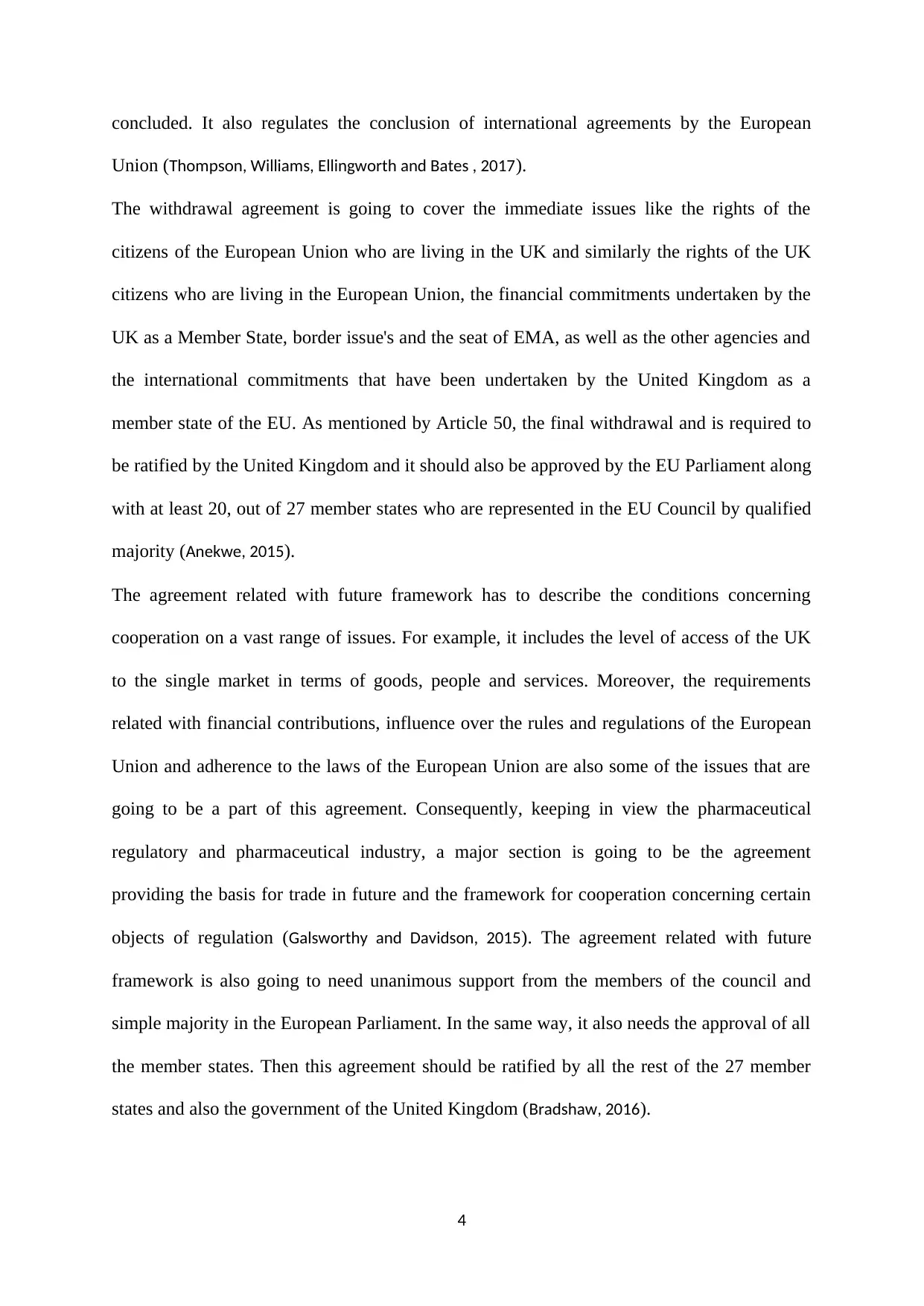
concluded. It also regulates the conclusion of international agreements by the European
Union (Thompson, Williams, Ellingworth and Bates , 2017).
The withdrawal agreement is going to cover the immediate issues like the rights of the
citizens of the European Union who are living in the UK and similarly the rights of the UK
citizens who are living in the European Union, the financial commitments undertaken by the
UK as a Member State, border issue's and the seat of EMA, as well as the other agencies and
the international commitments that have been undertaken by the United Kingdom as a
member state of the EU. As mentioned by Article 50, the final withdrawal and is required to
be ratified by the United Kingdom and it should also be approved by the EU Parliament along
with at least 20, out of 27 member states who are represented in the EU Council by qualified
majority (Anekwe, 2015).
The agreement related with future framework has to describe the conditions concerning
cooperation on a vast range of issues. For example, it includes the level of access of the UK
to the single market in terms of goods, people and services. Moreover, the requirements
related with financial contributions, influence over the rules and regulations of the European
Union and adherence to the laws of the European Union are also some of the issues that are
going to be a part of this agreement. Consequently, keeping in view the pharmaceutical
regulatory and pharmaceutical industry, a major section is going to be the agreement
providing the basis for trade in future and the framework for cooperation concerning certain
objects of regulation (Galsworthy and Davidson, 2015). The agreement related with future
framework is also going to need unanimous support from the members of the council and
simple majority in the European Parliament. In the same way, it also needs the approval of all
the member states. Then this agreement should be ratified by all the rest of the 27 member
states and also the government of the United Kingdom (Bradshaw, 2016).
4
Union (Thompson, Williams, Ellingworth and Bates , 2017).
The withdrawal agreement is going to cover the immediate issues like the rights of the
citizens of the European Union who are living in the UK and similarly the rights of the UK
citizens who are living in the European Union, the financial commitments undertaken by the
UK as a Member State, border issue's and the seat of EMA, as well as the other agencies and
the international commitments that have been undertaken by the United Kingdom as a
member state of the EU. As mentioned by Article 50, the final withdrawal and is required to
be ratified by the United Kingdom and it should also be approved by the EU Parliament along
with at least 20, out of 27 member states who are represented in the EU Council by qualified
majority (Anekwe, 2015).
The agreement related with future framework has to describe the conditions concerning
cooperation on a vast range of issues. For example, it includes the level of access of the UK
to the single market in terms of goods, people and services. Moreover, the requirements
related with financial contributions, influence over the rules and regulations of the European
Union and adherence to the laws of the European Union are also some of the issues that are
going to be a part of this agreement. Consequently, keeping in view the pharmaceutical
regulatory and pharmaceutical industry, a major section is going to be the agreement
providing the basis for trade in future and the framework for cooperation concerning certain
objects of regulation (Galsworthy and Davidson, 2015). The agreement related with future
framework is also going to need unanimous support from the members of the council and
simple majority in the European Parliament. In the same way, it also needs the approval of all
the member states. Then this agreement should be ratified by all the rest of the 27 member
states and also the government of the United Kingdom (Bradshaw, 2016).
4
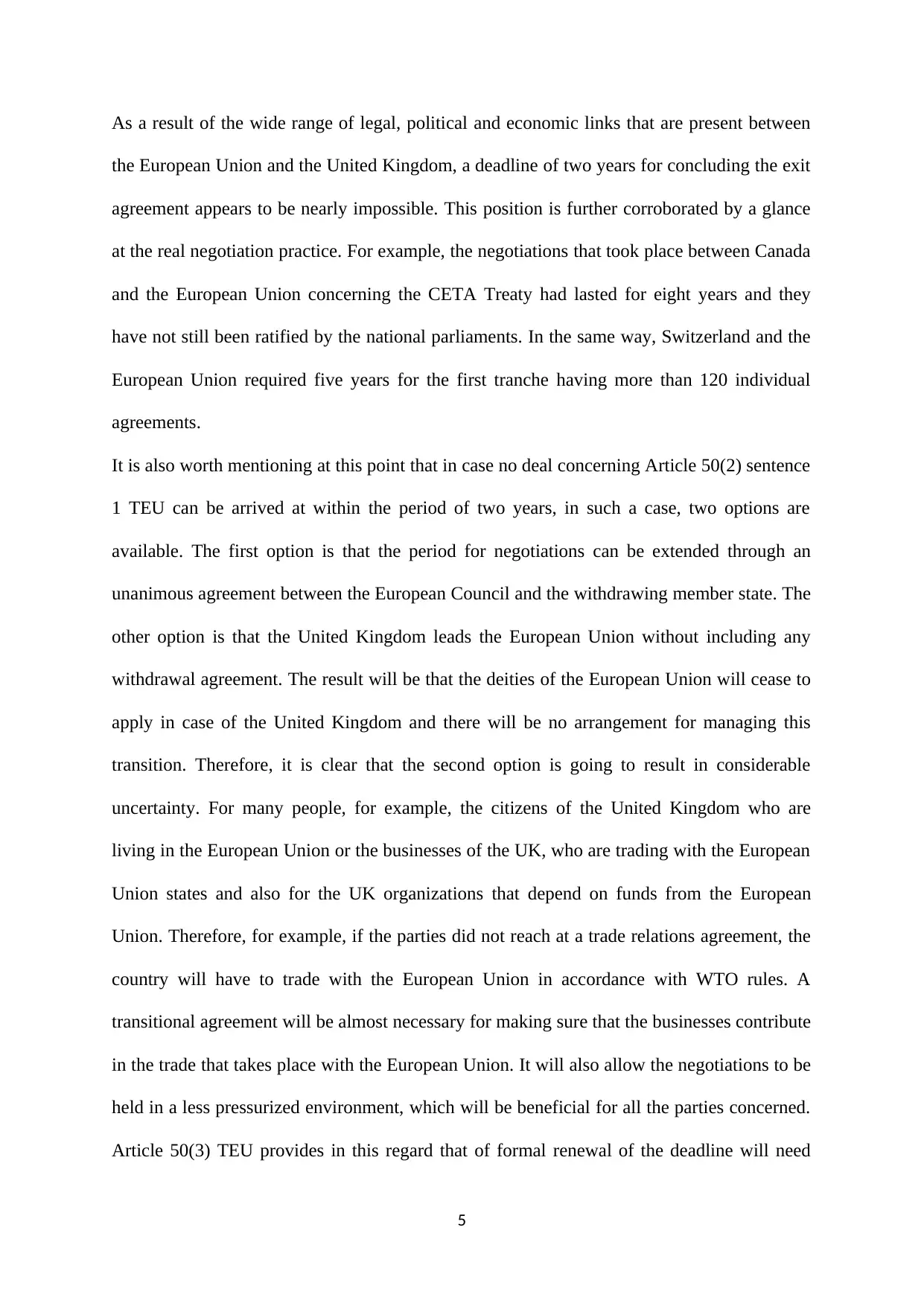
As a result of the wide range of legal, political and economic links that are present between
the European Union and the United Kingdom, a deadline of two years for concluding the exit
agreement appears to be nearly impossible. This position is further corroborated by a glance
at the real negotiation practice. For example, the negotiations that took place between Canada
and the European Union concerning the CETA Treaty had lasted for eight years and they
have not still been ratified by the national parliaments. In the same way, Switzerland and the
European Union required five years for the first tranche having more than 120 individual
agreements.
It is also worth mentioning at this point that in case no deal concerning Article 50(2) sentence
1 TEU can be arrived at within the period of two years, in such a case, two options are
available. The first option is that the period for negotiations can be extended through an
unanimous agreement between the European Council and the withdrawing member state. The
other option is that the United Kingdom leads the European Union without including any
withdrawal agreement. The result will be that the deities of the European Union will cease to
apply in case of the United Kingdom and there will be no arrangement for managing this
transition. Therefore, it is clear that the second option is going to result in considerable
uncertainty. For many people, for example, the citizens of the United Kingdom who are
living in the European Union or the businesses of the UK, who are trading with the European
Union states and also for the UK organizations that depend on funds from the European
Union. Therefore, for example, if the parties did not reach at a trade relations agreement, the
country will have to trade with the European Union in accordance with WTO rules. A
transitional agreement will be almost necessary for making sure that the businesses contribute
in the trade that takes place with the European Union. It will also allow the negotiations to be
held in a less pressurized environment, which will be beneficial for all the parties concerned.
Article 50(3) TEU provides in this regard that of formal renewal of the deadline will need
5
the European Union and the United Kingdom, a deadline of two years for concluding the exit
agreement appears to be nearly impossible. This position is further corroborated by a glance
at the real negotiation practice. For example, the negotiations that took place between Canada
and the European Union concerning the CETA Treaty had lasted for eight years and they
have not still been ratified by the national parliaments. In the same way, Switzerland and the
European Union required five years for the first tranche having more than 120 individual
agreements.
It is also worth mentioning at this point that in case no deal concerning Article 50(2) sentence
1 TEU can be arrived at within the period of two years, in such a case, two options are
available. The first option is that the period for negotiations can be extended through an
unanimous agreement between the European Council and the withdrawing member state. The
other option is that the United Kingdom leads the European Union without including any
withdrawal agreement. The result will be that the deities of the European Union will cease to
apply in case of the United Kingdom and there will be no arrangement for managing this
transition. Therefore, it is clear that the second option is going to result in considerable
uncertainty. For many people, for example, the citizens of the United Kingdom who are
living in the European Union or the businesses of the UK, who are trading with the European
Union states and also for the UK organizations that depend on funds from the European
Union. Therefore, for example, if the parties did not reach at a trade relations agreement, the
country will have to trade with the European Union in accordance with WTO rules. A
transitional agreement will be almost necessary for making sure that the businesses contribute
in the trade that takes place with the European Union. It will also allow the negotiations to be
held in a less pressurized environment, which will be beneficial for all the parties concerned.
Article 50(3) TEU provides in this regard that of formal renewal of the deadline will need
5
⊘ This is a preview!⊘
Do you want full access?
Subscribe today to unlock all pages.

Trusted by 1+ million students worldwide
1 out of 52
Your All-in-One AI-Powered Toolkit for Academic Success.
+13062052269
info@desklib.com
Available 24*7 on WhatsApp / Email
![[object Object]](/_next/static/media/star-bottom.7253800d.svg)
Unlock your academic potential
Copyright © 2020–2026 A2Z Services. All Rights Reserved. Developed and managed by ZUCOL.
